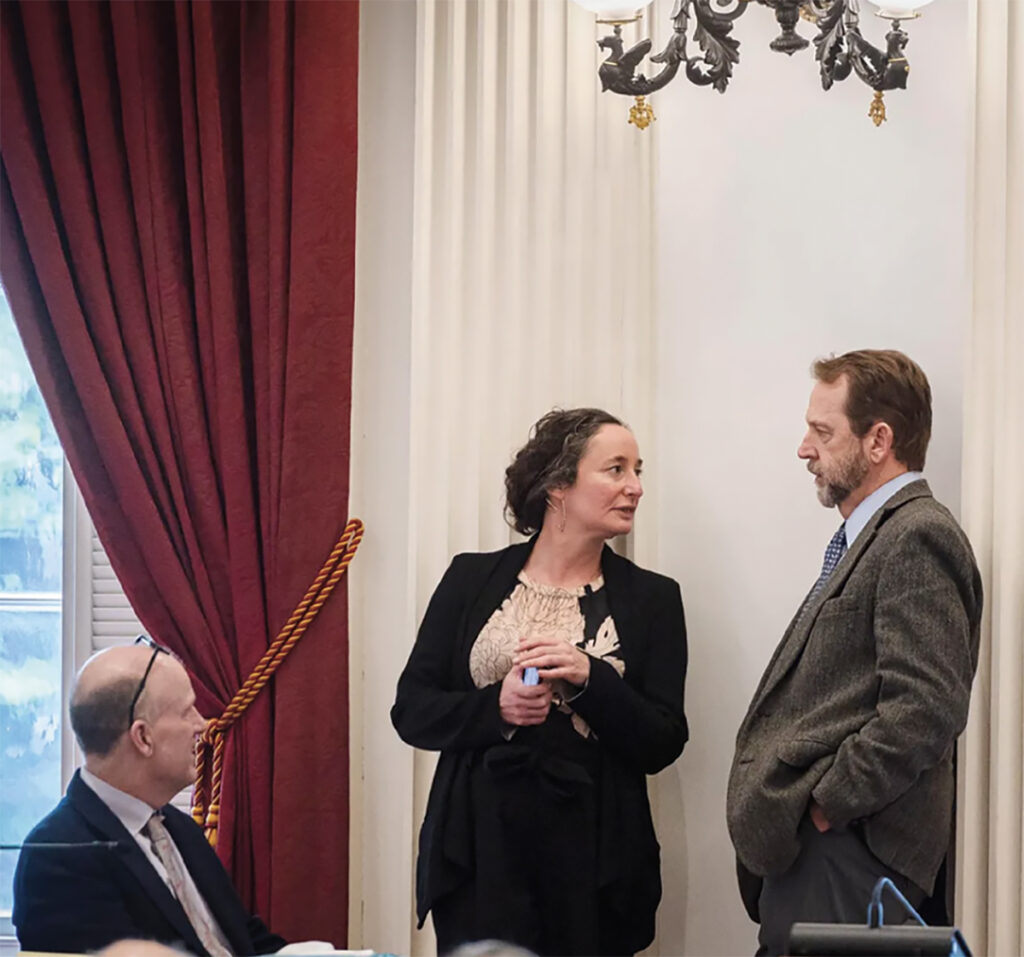People listen during a press conference held by Downstream Vermonters, a coalition of people opposed to higher taxes and more regulations coming from the state government, at the State House in Montpelier on Thursday, May 9.
By Ethan Weinstein/VTDigger
On the campaign trail, state legislative candidates say affordability dominates conversations with constituents. Property taxes — and with them, the cost of education — are fueling some of the most fiery rhetoric.
This year, education property taxes rose an average of 13.8% statewide, driven by school spending approved by district boards and voters. And with Democrats holding supermajorities in both the Vermont House and Senate, Republicans are seeking to capitalize on voter discontent by pointing the finger at the ruling party.
“I think it’s the first time in a while that some incumbents are being held accountable and feel like they’re a little bit on the defensive,” said Jason Maulucci, campaign manager for Gov. Phil Scott. “The message that we’re running with is, ‘What we have clearly isn’t working, and we need change’.”
Scott has campaigned more aggressively than in recent years for members of his party, stumping for Republican legislative candidates in an effort to end the Legislature’s Democratic dominance. According to Maulucci, the governor is out three or four days a week supporting fellow Republicans.
Democrats, for their part, say the governor’s education finance ideas arrived at the last minute this legislative session and put the state at financial risk. When they hear from frustrated voters, some Democrats say they point out that the average statewide property tax increase is a matter of local choices, not state-level policy making.
“Generally, what I say to that is that I voted to fund budgets that voters around the state have approved, that they voted for and passed, and they’ve sent to the Legislature and said, ‘Please pay the bill,’” said Rep. Carl Demrow, D-Corinth, who’s facing a contested election in a purple Orange County district. “That’s our job.”
Maulucci, though, said he believes the local GOP is on the right side of public opinion when it comes to property taxes.
“I think our message is pretty clear, and it’s been consistent: The cost of living is way too high in Vermont,” he said. “Republican, Democrat, independent or progressive, you’re feeling the pinch.”
In Vermont, property taxes contribute to funding both municipal and school budgets. It’s the latter that drives the political rhetoric on the issue, especially after the cost of education increased by about $180 million last year.
That rise fueled a historic rejection of nearly one in three local school budgets, ballot items typically rubber-stamped by voters. That kind of voter response suggests property taxes may be driving Vermonters’ decision-making.
But whether property taxes will prove the bellwether issue in 2024 legislative races remains to be seen.
‘Guilty by association’
Regardless of their voting records, some Democrats are finding themselves on the back foot when it comes to property taxes.
Rep. Jay Hooper, D-Randolph, voted against the so-called yield bill, which levies property taxes in order to fund local school budgets. This year, the bill was vetoed by the governor, unsettling public school funding, until lawmakers ultimately overrode that veto, solidifying the average education tax increase of 13.8% statewide.
Despite his voting record, Hooper said he knows he has angry constituents.
“I think I will lose a lot of votes,” he said. “I’m guilty by association. I don’t like to be an apologetic Democrat.”
Hooper said he’s also heard from House colleagues frustrated by the aggressive reception they’ve received from voters, forced to choke down a “cold meal,” as he put it, “and try not to throw it up in front of their constituents.”
The campaign line for Democrats, according to Hooper, is to take the “totally irrefutable” position of telling voters “you guys voted on your [school] budgets,” and lawmakers only provided the funding for those budgets.
Hooper, thanks to his votes to affirm Scott’s vetoes, is the only Democrat with the governor’s endorsement, despite having a Republican challenger in his Orange County House race.
Rep. Katherine Sims, D-Craftsbury, who’s running for Orleans County’s Senate seat, is one of just three other Democrats who voted to sustain the governor’s veto of the yield bill, though she did vote “yes” in earlier roll calls. Unlike Hooper, Sims did not receive Scott’s endorsement.
“There’s an attempt to paint all Democrats with a broad brush, and it’s just not true,” said Sims, who also supported Scott’s veto of the renewable energy standard. “There are plenty of times I’ve voted ‘no’ when things aren’t in the best interest of our district.”
A political mailer distributed in the Orleans Senate district in support of Sims’ opponent said she had “voted to raise your property taxes,” a reference to the yield bill. Sims characterized the postcard as “simply not true.”
Asked if she was surprised Scott endorsed her opponent, Sam Douglass, Sims said she’d had “multiple conversations” with the governor’s team and “collaborated with the administration on introducing a number of bills.”
“In the end, unfortunately, you know, things often end up with political leaders making political decisions,” she said.
A statewide average, but local realities
While property taxes rose an average of nearly 14% across the state, actual changes varied widely from town to town, and many of the biggest increases hit deep blue communities.
Windsor County towns such as Woodstock, Bridgewater and Plymouth — considered Democratic strongholds — saw spikes of 30% or more. Other higher-than-average increases hit similarly blue parts of Addison County, the suburbs south of Burlington and the Orange County Democratic haven of Thetford.
Elsewhere in the state, increases were far smaller or even nonexistent, creating local particulars that differ from the statewide narrative.
In Barre City, local school board chair Michael Boutin is running for the House as a Republican, hoping to flip one of the district’s two seats.
Like many communities, Barre struggled to pass a school budget, though the district’s efforts dragged on longer than anywhere else. Boutin, who leads a board repeatedly divided over whether to support their district’s spending plan, voiced his approval of the community’s budget, which ultimately raised taxes less than 1% in the city.
That modest increase means property taxes aren’t necessarily driving conversations in Barre about affordability.
“We thankfully did not experience that kind of [tax rate] jump that would’ve been devastating for our community,” Boutin said.
Still, the Republican candidate said affordability is the No. 1 issue he’s hearing from constituents, with the conversations centered on other costs, like energy.
“I think that most voters that I’ve talked to are kind of terrified about the Clean Heat Standard,” he said.
Boutin, with his school board background, is still campaigning on education, even though the property tax issue doesn’t resonate with Barre City residents as much as elsewhere.
For him, the primary problem is how confusing the system is, particularly Vermont’s education funding formula.
“If [voters] can’t understand it, it’s a bad bill, period,” Boutin said. “We cannot confuse our constituents, and that’s what we’ve been doing with our education funding.”
Correcting ‘misinformation’ and ticket-splitting
The Orange-1 House district, which includes Orange, Washington, Corinth and Vershire, has supported both Republicans and Democrats in recent years.
Demrow, the Corinth Democrat, is hoping to defend his seat against Republican challenger Michael Tagliavia, a former candidate for Vermont Attorney General.
In theory, Demrow could find himself vulnerable to attacks based on the state’s rising property taxes. With his assistant leadership position in the House Ways and Means Committee, he has a front-row seat to education finance policy making.
But in much of Demrow’s district, property taxes are actually falling, thanks to the latest changes to Vermont’s school funding formula, which give relative tax relief to communities with students who are more expensive to educate, such as those in rural and more impoverished towns.
“I won the Act 127 lottery,” Demrow said in an interview, referencing the latest pupil weighting bill.
Still, he has found voters angry about property taxes. Demrow recalled a school budget meeting this spring during which he explained that despite a rising budget, residents could expect tax bills to decrease.
“I had people come up to me afterwards and say, like, ‘You’re lying,’” Demrow said. “It’s difficult sometimes to get messages across about this stuff.”
The same dynamic has played out while he’s knocked on doors — including at the home of an elderly couple last week.
“The husband said, ‘You know, I was going to vote for you, but then I heard you raised our property taxes 14%,’” Demrow recalled. “Then his wife said, ‘Our property taxes went down.’ You know, she’s the one who writes the checks and pays the bills.”
Though in that instance Demrow was able to correct what he called “misinformation,” the conversation points to the saturation of the Republicans’ message.
The narrative is set. But actual votes? Those are still uncertain.
“I think the message is resonating,” said Maulucci, the governor’s campaign manager.
But in a presidential election year, he questioned the willingness of the state’s Democrats to split their ticket and vote for a Republican legislative candidate, as many tend to do with Scott.
“It’s just a question of whether it’ll be enough to overcome some of the national headwind,” he said.

Rep. Emilie Kornheiser, D-Brattleboro, left, confers with Rep. Carl Demrow, D-Corinth, during a break on the floor of the House at the Statehouse. Kornheiser and Demrow are the chair and the ranking member, respectively, of the House Ways and Means Committee.




